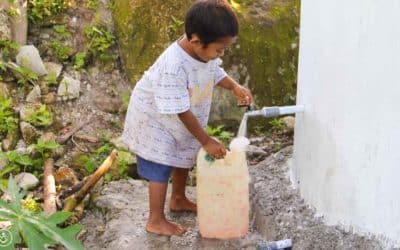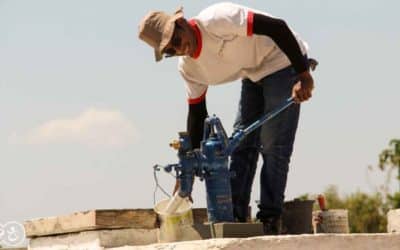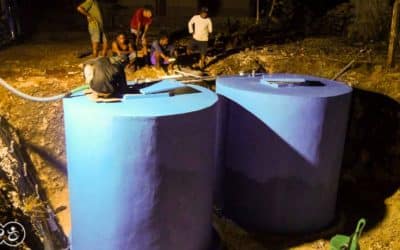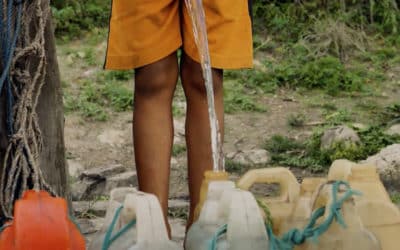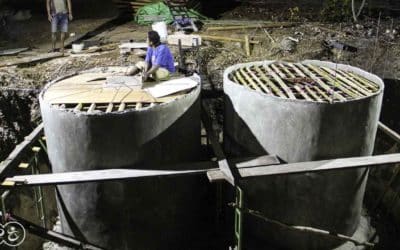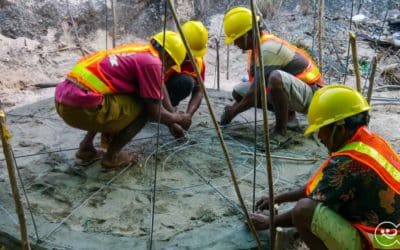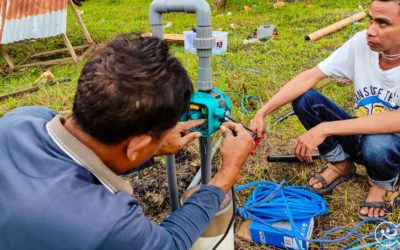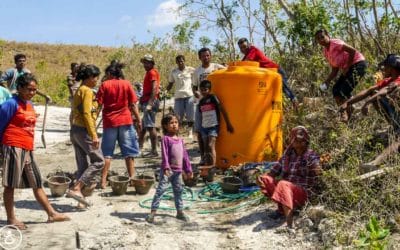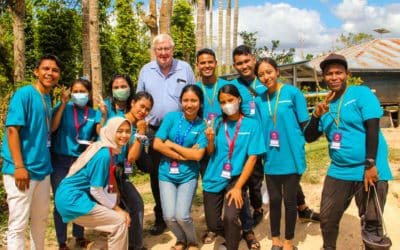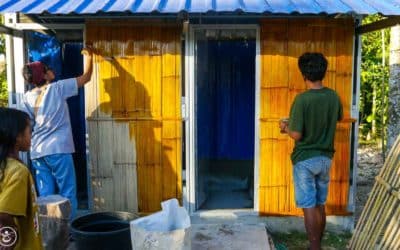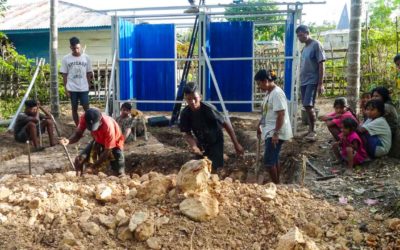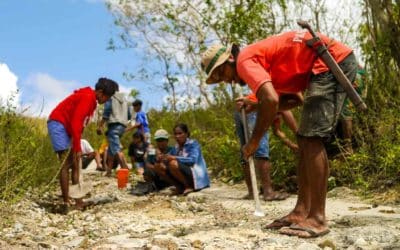In East Sumba, a 60-meter deep drilling project stands as a beacon of transformation. This gargantuan endeavor by Fair Future and Kawan Baik is not just about providing clean water; it’s a comprehensive approach to improve public health, education, and quality of life for over 2,000 people. This is where the battle against diseases like malaria takes a new turn, a testament to human resilience.
In the scattered hills of East Sumba, 5,300-litre ferrocement tanks collect each drop of rain. Families help build and maintain them. Children drink safely, and women no longer have to carry 20-kilo jerrycans for hours. Water near the house is a primary source of health care.
Donate
Support Care
Programs
All projects
Quick News
Field updates
Stories
Field stories
Do you know what actions Fair Future is taking to solve the problem of lack of clean water?
The Water Connections program aims to provide fair and safe access to clean water. This initiative not only prevents diseases and reduces health risks, but also sustains lives, decreases infant mortality, and promotes economic prosperity.
The Water Connections category of Fair Future Foundation shares our vital work in improving clean water access and sanitation in ultra-rural Indonesia. Through wells, reservoirs, and water-saving initiatives, we help communities secure reliable, safe water. These stories highlight how our water projects improve health, reduce disease, and bring new hope to children and families living in the most remote and challenging environments.
Clean water and sanitary facilities
Dragon Pumps: Fair Future’s #WaterConnections in Laindatang
The arrival of Dragon pumps in Laindatang, East Sumba, marks a watershed moment in Fair Future’s #WaterConnections project. In collaboration with Kawan Baik and Rotary Australia, we are transforming the health landscape of this isolated village. From reducing the prevalence of infectious diseases to providing the first-ever sanitary installations, discover how clean water is rewriting the community’s story.
Bringing Clean Water to Tanambanas #WaterConnections
Fair Future’s #WaterConnections project is a beacon of hope in Tanambanas, Sumba, where every drop of water is a treasure. By collecting and filtering rainwater, we’re creating not just reservoirs but sanctuaries of health. Dive into this inspiring story of how innovation and collective effort are changing lives, one drop at a time.
Matawai: Fair Future’s Eye-Opening Documentary on East Indonesia’s Water Crisis
Matawai’ serves as a profound wakeup call to the global community about the water crisis in Eastern Indonesia. Produced by Fair Future Foundation, this compelling documentary vividly portrays the day-to-day struggles of rural families. Through this film, you’ll also witness the groundbreaking initiatives we’ve implemented to transform access to clean water, sanitation, and hygiene education. We invite you to join Fair Future in advocating for universal access to these basic human needs.
Revolutionizing Water Access in Tanambanas: Sustainable Ferrocement Solution
Fair Future, in partnership with Kawan Baik, is taking revolutionary strides to resolve the critical water shortage in Tanambanas. This groundbreaking initiative employs innovative ferrocement technology to build durable, cost-effective water reservoirs. More than just a construction project, this initiative is a lifeline for an ultra-rural community, catalyzing improved health, poverty reduction, and ensuring the fundamental human right to clean water.
Revolutionizing Water Access: Tanambanas Water Connection Project
Imagine a region where water is as precious as gold, where communities face eight-month-long dry seasons. Now, picture a bold initiative, the Tanambanas Water Connection Project, designed to capture and store rainwater ingeniously. Join us on this journey of innovation and resilience as we bring hope, clean water, and a brighter future to the people of Tanambanas.
Fair Future Foundation Transforms Healthcare in Mahu with Clean Water Access
In the heart of East Sumba, Fair Future Foundation’s relentless efforts have brought a significant transformation to healthcare. Access to clean water, a basic necessity, has been restored at the Mahu health center (Puskesmas), benefiting over 20,000 individuals.
Empowering Laindatatang: A Road to Opportunity and Unity
Embark on a journey with the families of Laindatatang village, as they, with the support of Fair Future and Kawan Baik, successfully transformed access to their community, ushering in new opportunities for all. Explore how this ambitious infrastructure project, marked by unwavering dedication and local involvement, symbolizes a commitment to community well-being and a brighter future. Read on to uncover the story behind the Laindatatang Access Road Project.
Transforming Lives in East Sumba: Rotary Australia’s Vital Partnership
The partnership between Rotary Australia and Fair Future aims to make a positive impact on vulnerable communities in East Sumba. Through a joint effort, we are dedicated to providing clean water access and disease control, which will help bring hope and a brighter future to these communities. Our collaboration highlights the importance of friendship and teamwork in achieving these life-changing initiatives. Explore the transformative results of our revolutionary programs and witness the strength of our commitment to making a difference.
A bold step towards sanitation and clean water for Laindatang
Laindatang in East Sumba, no clean water and no sanitation facilities. Fair Future changes this reality and brings about a remarkable transformation. A monumental journey that promises to revolutionize the future of this ultra-rural community. They don’t just build buildings, they create hope and opportunity. Their unwavering commitment is to strengthening the health and well-being of families who have faced isolation and hardship for too long.
Bringing Sanitation to an Underserved Village in East Sumba
The image illustrates our ongoing project: the excavation of a septic tank. This is the very first step towards the installation of the first-ever sanitation infrastructure in the village's history. Our goal is to reinforce the health and well-being of the families in this community. In closely associating ourselves with the villagers, a core principle in our approach, we work hand in hand to provide them vital access to water and sanitation facilities, despite their isolation in the eastern part of Sumba.
For several months now, our organizations – Fair Future and Kawan Baik – have favored constructing lightweight steel facilities. This decision is based on hygiene, maintenance, and construction efficiency grounds. The entire structure (in this case, two toilet – shower stalls) is constructed at the Fair Future Foundation’s base camp in Waingapu, called Rumah Kambera. We then transport the dismantled structure to the site of installation. It takes about a week for our team to operationalize an installation like this, followed by one to two weeks dedicated to finishing and aesthetic touch-ups.
In this underprivileged environment, families lack access to basic services, needs such as access to water or electricity are non-existent. During the dry season, when rainwater tanks are almost empty, they must travel miles to collect just a few litres of often unsuitable water. See the related #waterconnections posts here.
In the village of Laindatang, inhabitants have never had the privilege of a working shower or toilet. The enthusiasm and joy are palpable as they witness the construction of these new facilities, bringing them a simple feeling of happiness.
This installation will also contribute to reducing infectious diseases caused by the absence of adequate sanitation facilities in the village. This will likely lead to an increase in the quality of life for the villagers, a reduction in the time spent gathering water, and promote overall community health and well-being. This initiative is more than just building sanitation facilities. It symbolizes the start of a new chapter for Laindatang, signifying change and development towards a healthier community.
Thus, the work of Fair Future and Kawan Baik extends beyond physical construction, promoting progress, health, and hope for the future.
The access to the village is a hope for a better life
Discover the remarkable progress in our ongoing construction and repair efforts on the road to Laindatatang village in East Sumba. The Fair Future Foundation has been at the forefront, meticulously coordinating and overseeing this significant project for months. We’re thrilled to share that material trucks and tanker trucks can now effortlessly reach the village.



